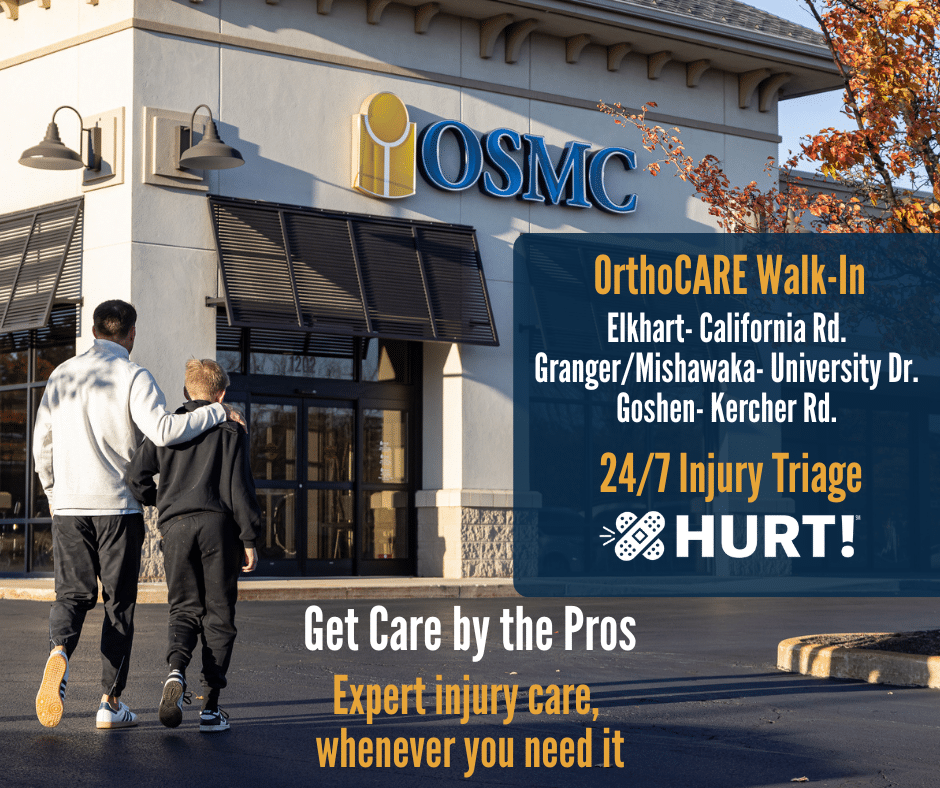Orthopedic Hip Pain Specialist in South Bend, IN
Expert Hip Pain Doctors In Northern Indiana
As one of the largest weight-bearing joints in the body, your hips allow you to maintain balance and stability while allowing your legs to move and rotate. If you’re experiencing hip pain or restricted mobility, you have many options for treatment. At OSMC, our specially trained doctors are leaders in diagnosing and treating hip injuries and conditions. We offer surgical and nonsurgical treatment approaches for hip pain.
What Can Cause Hip Pain?
The orthopedic specialists at OSMC offer treatment for many conditions that cause hip pain. Some common conditions and injuries that may cause hip pain include:
Strains in the muscles surrounding the hip
- Strains in the muscles surrounding the hip
- Pain in the hip
- Hip fracture
- Hip impingement
- Degeneration of the joint
- Arthritis
- Traumatic injury
- Muscle strain
- Hip bursitis
- Osteoarthritis
- Abnormalities of the joint
- Avascular necrosis
When Should You See a Hip Pain Specialist?
If you are experiencing hip pain or any of these symptoms, we recommend making an appointment with OSMC or visiting one of our walk-in orthopedic clinics.
- Constant or intermittent stiffness in the hip
- Limited range of motion at the hip joint
- Hip pain which may also cause pain in the knee and ankle in the same leg
- You are unable to walk due to hip pain
- Pain in the hip with certain activities, such as going up the stairs or getting up from a chair
- Excessive swelling
- Hip pain after a bad fall
- Hip pain that gets worse with activity
What Types of Hips Surgery are Available at OSMC?
Our OSMC surgery centers offer various types of hip surgery in the Michiana region, including:
- Hip arthroscopy
- Revision hip surgery
- Total hip replacement
- Partial hip replacement
- Hip resurfacing
How Do I Know If I Need a Hip Replacement?
A hip replacement surgery may be necessary when the hip joint is so worn out or damaged that it hurts even when resting and makes it hard to move. During hip replacement surgery, the damaged parts of the hip joint are removed and replaced with artificial parts made of metal, ceramic, or hard plastic. This artificial joint helps relieve pain and improve the overall function of the hip. A total hip replacement is commonly needed due to these conditions:
- Osteoarthritis
- Rheumatoid arthritis
- Hip fracture
- Disorders that cause bone deformities
What is Recovery from Hip Surgery Like?
After hip replacement surgery, you'll have a higher risk of blood clots in your legs for a short time. Moving as soon as possible after surgery is important to reduce your risk of blood clots. You will have to sit up and walk with crutches by the next day. When you get home, physical therapy will be a big part of your healing, and how long recovery takes will depend on how well you do in your therapy.
Schedule an Appointment with an Expert Hip Surgeon
If you require hip pain treatment or hip surgery, it’s time to call 574-264-0791 and schedule an appointment with one of the leading orthopedic specialists at OSMC. Same-day appointments are available at all locations, and no appointment is necessary at our orthopedic walk-in clinics.

Here at OSMC, our physicians are dedicated to helping you achieve a pain-free lifestyle. If you are experiencing hip pain or any symptoms of a hip condition, give us a call at 574-264-0791.



